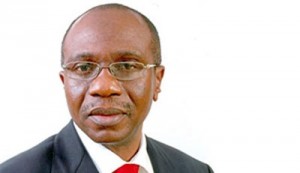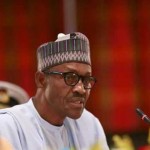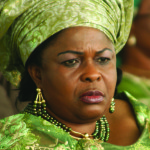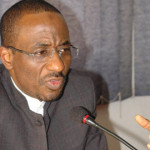Editorial: Godwin Emefiele: A Reformer or Conspirator?
Featured, Latest Headlines Thursday, June 5th, 2014
By Tajudeen Balogun
Tongues wagged and debates were torrent as well as heated, across the country on the announcement by President Goodluck Jonathan’s Special Adviser on Media, Dr. Reuben Abati, the suspension of immediate former Governor of Central Bank of Nigeria (CBN), Mallam Sanusi Lamido Sanusi late February this year. Interestingly, Sanusi was in far Republic of Niger, where he was attending an official engagement, hence, received the breaking news of his sack like many other Nigerians on mass media and via confidants.
The public reactions on the suspension were mixed and somewhat exuded some sentiments. Some Pundits were of the opinion that why the sack, especially as the former Governor’s five years single tenure has almost reached crescendo. They argued that President Jonathan goofed with the move and only made Sanusi more popular and somehow made him gained more public sympathy, given avalanches of allegations of sharp practices he had repeatedly leveled against certain government agencies, perceived to enjoy the support of the power that be. Notably among the accusations was the letter he wrote to the President reporting non remittance by the Nigeria National Petroleum Corporation (NNPC) the sum of $49.8 billion (about three times the nation’s annual budget) to the Federation Account.
However, the government on its part accused Sanusi of financial misconduct and recklessness, disloyalty, insubordination, hobnobbing and surreptitiously sponsoring and supporting the opposition against the government. For example, the investigation agency queried under Sanusi’s leadership the Payment to Nigerian Security Printing and Minting, NSPM, of N38.233 billion in 2011 for “printing of banknotes” which was N8.836 billion more than the security printing firm’s turnover of N29.370 billion in 2011, approval of N3.855 billion staff loan which was written off in 2012, the reported promotional activities which budget soared to N3.086 billion in 2012, almost triple the N1.084 billion spent on the same subject in 2011.
In fact, the ex CBN Governor was blamed by the Financial Reporting Committee of Nigeria (FRCN), of declining its summon when called upon to come and respond and clarify some reckless expenses approved by him while still in the office. Sanusi denied ever receiving any letter, let alone having notice for explanation. He was reported to have said if invited, ordinarily, that would give him a golden opportunity to clarify any ambiguity and defend frivolous accusations hauled at him. He claimed those behind the letter were out to blackmail him and described the move as a calculated attempt to call a dog bad name.
Still, Mallam Sanusi at a stage when in office appeared to be speaking from the two sides of his mouth when later reportedly blamed CBN’s Reserve Department for misleading him and told the country’s Senate committee investigating the allegations that he had apologized privately to those his letter indicted, yet there “were indications that NNPC’s accounts were untidy”.
Considering his suspension unjust, Sanusi headed to court, praying it to declare the government action illegal, hence crush it and reinstate him to the exalted seat. The court ruled against the plaintiff (Sanusi), ruling that the government was his employer, therefore, has the prerogative to hire and fire when deemed fit. That somehow amounted to a serious setback in his legal tussle against the suspension decision by the government.
Then, regardless of public take on his action and Sanusi frantic moves to reverse the development, President Gooluck Jonathan went ahead to announce the nomination of a fellow South-South, vast, seasoned financial expert and a banker, Godwin Emefiele as Sanusi’s successor. The Governor-designate, fully resumes today – June 4, 2014.
Given the nature of Sanusi’s allegations, the perceived cold government’s position and reaction when the controversy raged, the sack and replacement of former CBN with fellow kinsmen, some feel that the appointment of the new helmsman might be primarily for conspiracy rather than much expected and claimed cleansing and sanity in the country’s financial sector. The former position might hold water when consider for instance, the shocking clearance of Minister of Petroleum, Diezinne Allison-Madueke of financial misappropriation (despite many allegations) and announcement that no money was ever missing in the NNPC. The strange clean bill record came on the eve of celebration of 15 years of democracy in Nigeria last week. Not a few Nigerians regarded the senate announcement as unbecoming and fishy.
However, ahead of the new Governor’s resumption today, for the umpteenth time, members of the Central Bank of Nigeria (CBN) Monetary Policy Committee (MPC) have “unanimously voted to retain the current stance of monetary policy.” The members opted to so in line with analysts’ expectation by retaining the benchmark interest rate at 12 percent and despite a marginal rise in inflation rate in April as released by the National Bureau of Statistics (NBS), penultimate this week.
Similarly, the decision was also despite what the committee described external and domestic risk factors, including “the prospects for increased yields and interest rates in the US and the rather low level of economic activity in the emerging markets.
Not only the CBN staff are willing to receive the new apex bank boss and his agenda which is to be formally unveiled on Thursday, the financial leaders and the rest of the country are anxious to have Emefiele’s roll-up plans expected to moderate and standardize the country’s financial system. Expectedly, some financial experts have started expressing their comments and expectations from the new apex bank Chief.
As reported by one of the national dailies, Mr Harrison Owoh, the Managing Director of HJ Trust & Investment Ltd. advised the governor should take a proper look at the Monetary Policy Rates and Cash Reserve Requirement, so as to make them more investor friendly. Owoh urged the Emefiele to pursue policies that would encourage lending, create employment and help the growth of the real sector. He also advised that “Emefiele should be a friend to the market, a reformer, team player and should not be judgmental”.
In contrary, Mr Henry Boyo, an economist expressed reservations on the market expectations from the new governor, noting that being a banker; he may not like to hurt his constituency. Boyo noted that high interest and exchange rates and non-lending to the real sector were the major problems of the Nigeria’s economy. He criticized banks that they have abandoned their major business and depended solely on huge liquidity in the system created by the CBN’s substitution of naira revenue for dollar revenue.
Finally, it will be premature now for anyone to determine whether the new Governor will pitch his tent only with his new employer, do it business as usual with his financial colleagues in the banking sub sector or prioritize the common interest and goal of the people and nation. Time… Only time will tell.
Related Posts
Short URL: https://www.africanexaminer.com/?p=12121






















